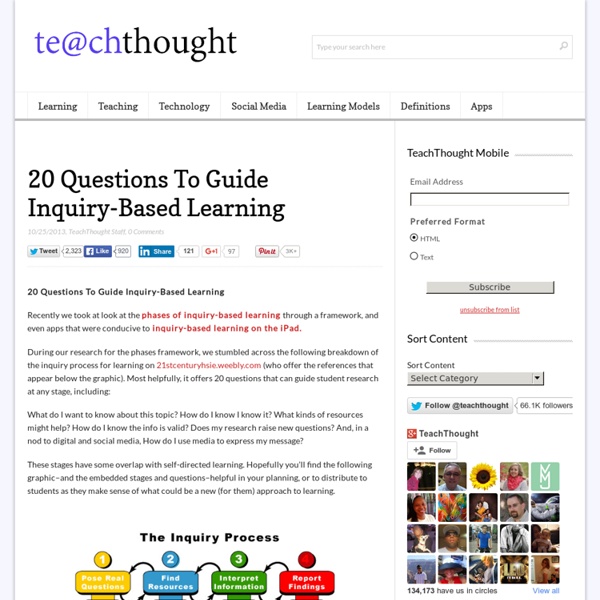



http://www.teachthought.com/learning/20-questions-guide-inquiry-based-learning/
Related: Lektionsupplägg • Inquiry-Based LearningA Teacher's Guide to Differentiating Instruction Introduction Does effectively teaching 30 students in one classroom require teachers to develop 30 lessons, one tailor-made for each student? Or should teachers “aim for the middle” and hope to reach most students in a given lesson? The answer is not simple. educationalresearchtechniques Inquiry learning is form of indirect instruction. Indirect instruction is teaching in which the students are actively involved in their learning by seeking solutions to problems or questions. In inquiry learning, students develop and investigate questions that they may have. 8 Strategies To Help Students Ask Great Questions 8 Strategies To Help Students Ask Great Questions by Terry Heick Questions can be extraordinary learning tools. A good question can open minds, shift paradigms, and force the uncomfortable but transformational cognitive dissonance that can help create thinkers. In education, we tend to value a student’s ability to answer our questions.
Effective Questioning Strategies Questioning Techniques Questioning is one of the most important dimensions of teaching and learning. It gives tutors the chance to find out what students know and understand, and it allows students to seek clarification and help. There are many types of questions. Curriculum differentiation - Schools Plus - The Department of Education Ideas on adjusting the curriculum to meet the needs of all students Schools Plus would like to acknowledge that the information listed below is a body of knowledge that has been collected from a variety of sources - teachers, workshops, classrooms and schools. Set achievable tasks providing regular feedback throughout the activity Teach the student to organize themselves by listing tasks to be done and when they are due. A visual system for younger students, a diary for older students. Sequence activities Have the student’s full attention before giving instructions Instructions, routines and rules should be kept short, concise, clear and positive.
Inquiry Learning Ideas for Math and Science With iPads Digital Tools Laurie Sullivan/Flickr By Sam Gliksman The following is the second of a series of excerpts from Gliksman’s book iPad in Education for Dummies. We tend to split science and humanities as though they were separate branches of life. Harvard Education Publishing Group - Home Students in Hayley Dupuy’s sixth-grade science class at the Jane Lathrop Stanford Middle School in Palo Alto, Calif., are beginning a unit on plate tectonics. In small groups, they are producing their own questions, quickly, one after another: What are plate tectonics? How fast do plates move? Why do plates move? Do plates affect temperature? What animals can sense the plates moving?
The Challenges and Realities of Inquiry-Based Learning Inquiry Learning Teaching Strategies Getty By Thom Markham Teachers in a rural southeast Michigan high school were recently discussing the odd behavior of the senior class. It seems the 12th graders were acting more civilly toward the junior class in the hallways. The How To's of Planning Lessons Differentiated by Learning Profile Figure 10.1. Focus on Learning Profile Learning-Style Preferences Creating Classrooms We Need: 8 Ways Into Inquiry Learning If kids can access information from sources other than school, and if school is no longer the only place where information lives, what, then happens to the role of this institution? “Our whole reason for showing up for school has changed, but infrastructure has stayed behind,” said Diana Laufenberg, who taught history at the progressive public school Science Leadership Academy for many years. Laufenberg provided some insight into how she guided students to find their own learning paths at school, and enumerated some of these ideas at SXSWEdu last week. 1. BE FLEXIBLE.
Great Questions Make for Great Science Education By Amy Pallant and Sarah J. Pryputniewicz In science and in education, questions are guideposts. They provide direction, pointing to the unknown, the frontier. Explore, Play, Discover: Websites, Activities & More Search form Search Low-cost, teacher-tested activities for the classroom and the curious. Science of Cooking • Explore the science behind food and cooking with recipes, activities, and Webcasts.PreviousNext Explore, Play, Discover: Websites, Activities, and More
Is School Enough? Documentary Film Delves In A documentary film premiering on public television today — “Is School Enough?” — takes the viewer inside the lives of teens from various backgrounds and reveals the importance of tapping into students’ passions to drive their learning. These are some of the covered topics. Students at English High School in Boston helped pilot a social networking and planning tool called Community Planit. The online platform offers participants a series of missions, problems to solve and questions to answer about how the school district could improve and meet student needs better.
Reinventing School From the Ground Up For Inquiry Learning By Thom Markham A grave miscalculation exists in the minds of many educators: That inquiry-based learning, project based learning, and 21st century competencies can flourish in industrial model schools. Under this world view, the inquiry goals of the Common Core State Standards are “strategies” to be added to the existing list of classroom techniques, while skills like collaboration, communication, or creativity can be taught despite 43-minute periods, desks in rows, and pacing guides set in stone. In other words, reaching the top of Bloom’s Taxonomy is important, but less so than maintaining regimental order.